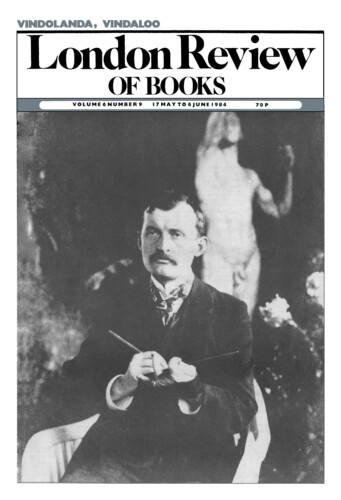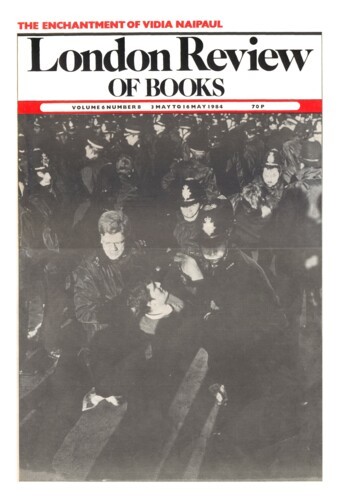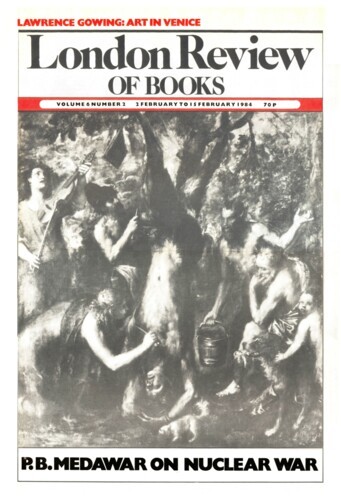Donald Davie
Donald Davie, who died in 1995, was a poet and critic who taught at many universities, including Trinity College Dublin, Cambridge, Essex, Stanford (where he succeeded Yvor Winters) and Vanderbilt. He was closely associated with the Movement, although his critical work ranged widely. His books include The Purity of Diction in English Verse, Under Briggflatts: A History of Poetry in Great Britain, 1960-88 and Ezra Pound: Poet as Sculptor. His Collected Poems was published by Carcanet in 1990 and a memoir, These the Companions, was reviewed in the LRB by Christopher Ricks.
The Road to Sligo
17 May 1984
Fit and Few
Donald Davie, 3 May 1984
‘Fit audience, though few,’ said Milton; and thereupon declared the terms in which the issue of reader-response would be considered by poets from his day to ours. The widely-read author asks: ‘How many of these many readers are fit readers?’ And the non-selling author asks: ‘Are the fit readers so few?’ The first predicament is the worse. For the non-selling author can always blame his publisher, or his distributors; whereas the best-selling author, weeping all the way to the bank, has no one to blame but himself. If he is in earnest – and if he isn’t we’ll not bother with him, any more than David Trotter does – he thought that he was testing his society by moving out to the periphery of that society, speaking for and with the disaffected, the vagabonds, the ill-adjusted. How disconcerting, then, to find that the disaffection he thought he was speaking for had struck a loudly answering chord from the settled centre! That is the predicament of Larkin, of Hughes, of Heaney: each of them initially supposing himself a marginal person speaking up for marginal people, yet forced to recognise – as the royalty statements convey their gratifying yet unnerving message – that the stance he had thought of as special was on the contrary representative. The Making of the Reader doesn’t explicitly make this point, but it’s one necessary inference from David Trotter’s exceptionally strenuous argument.–
Retrospective
Donald Davie, 2 February 1984
Andrew Crozier has lately written an exceptionally searching essay about British poetry since 1945, in which Norman MacCaig is named just once in passing. There is nothing wrong with that; Crozier isn’t attempting one of those limp ‘surveys’ in which everyone who deserves mention gets it. All the same I have the impression that a nod in passing – usually, it’s true, complimentary – is the most that MacCaig normally gets from any of us. If so, it isn’t good enough. Or so I feel, having enjoyed and admired his latest collection (by my count his 14th) more than any other book of verse in a long time.–
Mean
5 May 1983
Pieces about Donald Davie in the LRB
Enlarging Insularity: Donald Davie
Patrick McGuinness, 20 January 2000
In a recent poem, ‘Languedoc Variorum: A Defence of Heresy and Heretics’, the American poet Ed Dorn honours Donald Davie’s penultimate collection of poems, To Scorch or Freeze...
In Love
Michael Wood, 25 January 1996
He suffered fools grimly, because he thought there were so many of them, but he was himself far from grim. His laugh was a cross between a splutter and a chuckle, as if the joke had been cooking...
In praise of manly piety
Margaret Anne Doody, 9 June 1994
Donald Davie is already known for – among many other things – his striking comments on the hymns of Watts and Wesley in A Gathered Church: The Literature of the English Dissenting...
Christ’s Teeth
C.K. Stead, 10 October 1991
‘Dates, dates are of the essence; and it will be found that I date quite exactly the breakdown of the imaginative exploit of the Cantos: between the completion of the late sequence called...
Enormities
C.H. Sisson, 27 September 1990
What sort of a poet is Donald Davie? The factual answer, as with all poets, is to be found only in a volume such as the Collected Poems which he now lays before the public, but Davie himself...
Davie’s Rap
Neil Corcoran, 25 January 1990
One of the finest things in Donald Davie’s Under Briggflatts is a sustained, learned and densely implicative comparison of two poems about horses: Edwin Muir’s well-known,...
Lyrics and Ironies
Christopher Ricks, 4 December 1986
Faintly repelled by elaborate theories of irony and by taxonomies of it, D.J. Enright has set himself to muster instances, observations, localities and anecdotes. There is no continuing argument,...
Ten Poets
Denis Donoghue, 7 November 1985
One of Donald Davie’s early poems, and one of his strongest, is ‘Pushkin: A Didactic Poem’, from Brides of Reason (1955). As in Davie’s ‘Dream Forest’, Pushkin...
Clean Poetry
John Bayley, 18 August 1983
The Acmeist poet Zenkevich declared in 1911 that when he first met Anna Akhmatova he was struck by her saying that poetry was ‘something organic’, and that she was amused at the idea...
Armadillo
Christopher Ricks, 16 September 1982
Donald Davie’s critical arguments are often happily reminiscential, and his reminiscences are often happily argumentative, so the difference in kind between these two admirable books...
Poetry and Christianity
Barbara Everett, 4 February 1982
‘Water-Music’ makes in itself a fine concept, through the delicate difference of its components, water being transparent though sometimes audible, music being always audible and...
Donald Davie and the English
Christopher Ricks, 22 May 1980
‘Since Byron and Landor, no Englishman appears to have profited much from living abroad.’ So said an American who rightly believed himself to be profiting from living abroad, T.S....
Read anywhere with the London Review of Books app, available now from the App Store for Apple devices, Google Play for Android devices and Amazon for your Kindle Fire.
Sign up to our newsletter
For highlights from the latest issue, our archive and the blog, as well as news, events and exclusive promotions.





